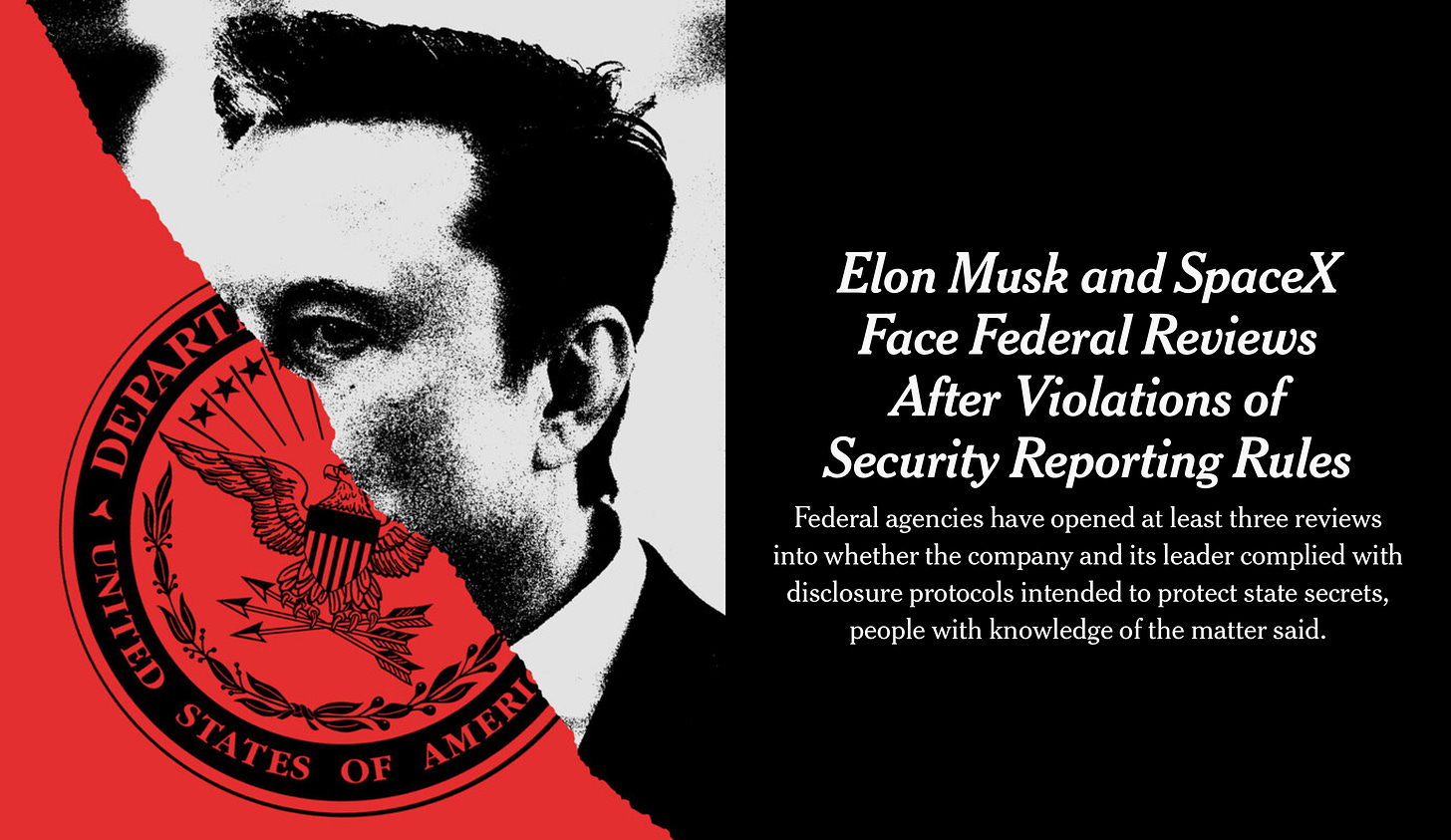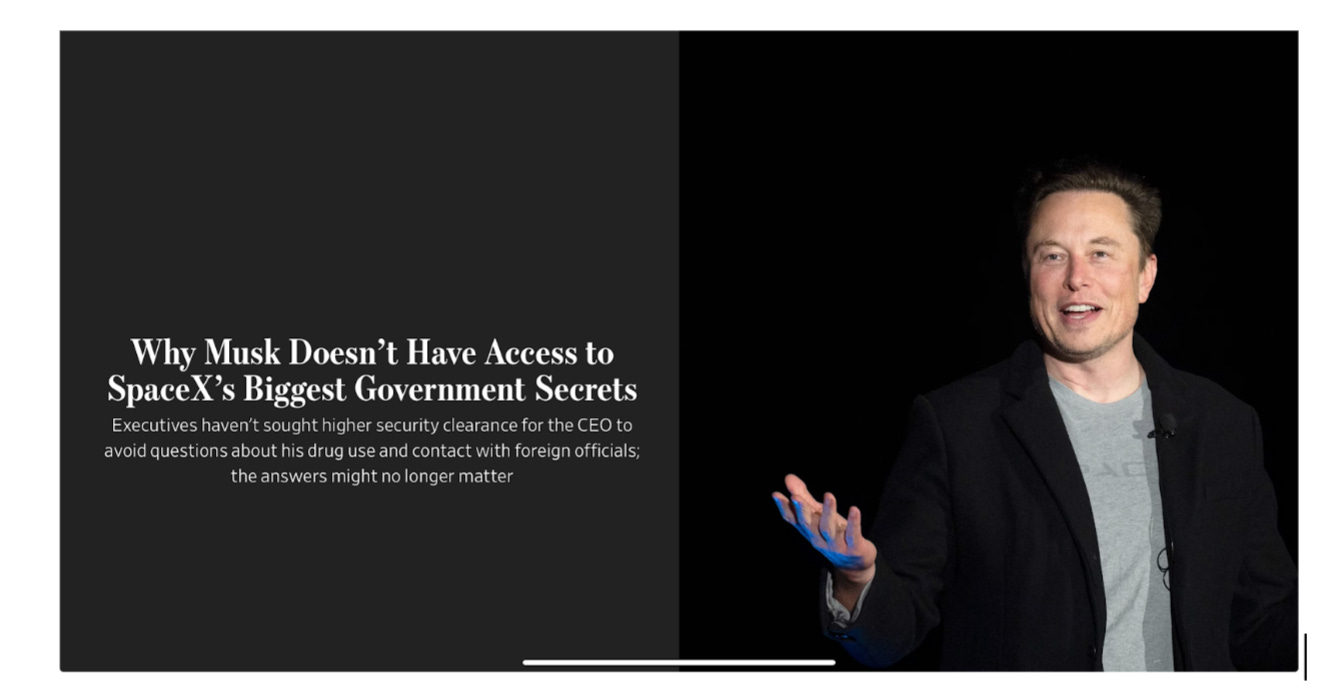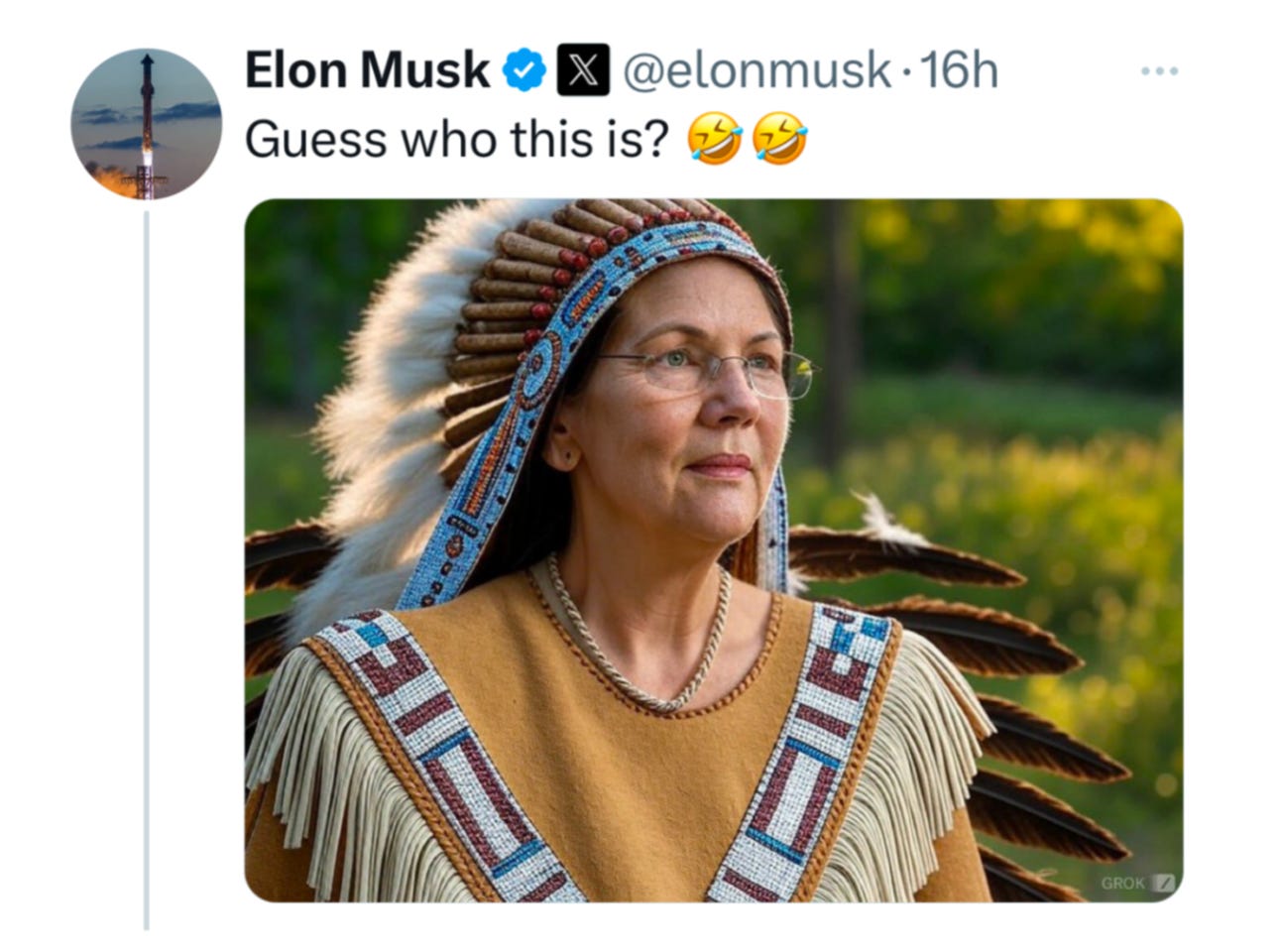A Musky Roundup
Elon Musk made the headlines in numerous separate ways this week, underscoring how the billionaire backer of Trump poses a high risk to the U.S.
The world’s richest and most awkward man isn’t even fully in charge of anything in the government, but he’s already drawing significant pushback and fire from multiple quarters.
Musk’s multiple business concerns across different industries are creating apparent conflicts of interest as the Trump transition team prepares for the incoming administration. Musk is a huge donor to the Trump campaign, having spent over $250 million to support Trump’s election. We’re now starting to see how he plans to make that investment pay off through policies designed to help his companies.
Further, because of his position heading the so-called Department of Government Efficiency, a Blue Ribbon-style commission tasked with cutting spending from the federal budget, Musk could in theory directly target agencies and people within the government who regulate or oversee his operations and activities.
Because of the importance of his companies, in particular SpaceX, to the U.S. government and military, Musk has openly flouted rules around reporting requirements for top secret security clearances. But that too has begun to catch up to him.
And now Musk is starting to look beyond U.S. politics to see how his immense wealth can be leveraged to influence other elections.
Let’s take a closer look at each of these.
Crash data? What crash data?
Reuters reported that the Trump transition team, in a document outlining a 100-day strategy for automotive policy, advises scrapping a car-crash reporting rule related to the safety of automated-driving systems.
Musk’s company Tesla reports the lion’s share of those crashes, over 1500 so far. A Reuters analysis of the crash data shows Tesla accounts for 40 out of 45 fatal crashes reported to the National Highway Traffic Safety Administration (NHTSA) through Oct. 15 of this year. So it’s no surprise that Tesla opposes the rule, which the advisory group has called a mandate for “excessive” data collection.
The NHTSA disagrees. Per Reuters, the agency said in a statement that
such data is crucial to evaluating the safety of emerging automated-driving technologies. Two former NHTSA employees said the crash-reporting requirements were pivotal to agency investigations into Tesla’s driver-assistance features that led to 2023 recalls. Without the data, they said, NHTSA cannot easily detect crash patterns that highlight safety problems.
The Trump transition team claims that the recommendations reviewed by Reuters come from “outsiders who have no role in charting administration policy.”
The story seems to have struck a nerve with Musk. He responded to the Reuters story on his X platform with blatant disinformation, amplifying a false claim that Reuters creates hit pieces funded by the Biden administration.
“The Biden Admin paid Reuters over $300 million in government contracts,” tweeted Mike Benz of “Foundation for Freedom Online,” adding the false claim that
11 different Biden government agencies targeted Elon’s businesses. All 11 agencies paid millions to Reuters. Reuters then won the Pulitzer Prize for “their work on Elon Musk and misconduct at his businesses”
Musk amplified a quote tweet of that lie to his 207 million followers that had falsely declared that “all those Reuters hit pieces were funded by the Biden administration.” Musk added, “This explains a lot. Shame on you @Reuters.”
In fact, it explains nothing, and either Musk is an idiot taken in by online garbage or he is a deliberate spreader of disinformation. As several users pointed out, Thomson Reuters has been contracting with federal agencies since 2009 to provide legal database support services such as Westlaw and Clear. Those government contracts existed under the Trump administration and have nothing to do with Reuters’ reporting on Musk or his companies.
Musk’s security clearance in the spotlight
The New York Times reported yesterday that both Musk and SpaceX have been flagged for federal review three times for failing to abide by security clearance reporting rules. Specifically, since at least 2021, they failed to disclose information such as Musk’s meetings with foreign leaders (including Vladimir Putin) and Musk’s drug use, which reportedly includes marijuana, pharmaceutical ketamine and recreational psychedelics. The lax reporting raises significant questions over his eligibility to handle highly classified information.
For example, in 2023 the Air Force rejected Musk’s request for the “Special Access Program,” which is a higher level of security clearance. A Pentagon official stated that Musk was rejected due to a “lack of explanation” for some of his meetings with foreign leaders. Without that higher level clearance, Musk shouldn’t be allowed into certain meetings between SpaceX and the AirForce, but officials are concerned Musk is attending them anyway.
One U.S. senator, Jeanne Shaheen (D-NH) is devoting significant attention to the matter, requesting that the Defense Department Inspector General look into Musk’s inappropriate and undisclosed talks with foreign leaders like Putin.
“To have someone who has major contracts with the government who would be in a position to pass along—whether deliberately or inadvertently—secrets is concerning,” Shaheen told the Times.
Separately, the Wall Street Journal confirmed that Musk has now been denied the highest level clearance, meaning he can’t even know what’s in SpaceX’s payloads.
Musk has brushed aside reports that he lacks the correct clearance, saying it matters little. As The Guardian reported,
At a Pennsylvania town hall in October, where he revealed that he had top-secret clearance, he told attendees in typical Musk fashion that “most of the stuff that I’m aware of … the reason to keep it top secret is it’s so boring.
“We don’t want to give exact instructions on how to make a nuclear bomb or something like that, but unless there’s a genuine risk to the country, all the information in the government should be public,” he added.
Musk also likely understands that if he lacks the right top level security clearances now, he need only wait until Trump is president, and Trump can bestow those clearances directly. That of course is a terrible idea, given his continuing communications with our foreign adversaries, but there may be little anyone can do about it other than shine a light on how Musk has flouted and abused the privilege and responsibility.
As Tom Nichols of The Atlantic observed with some bitterness,
It’s bad enough that Musk could be careless with classified data or expose himself to blackmail; it’s even more unsettling to imagine him undermining American security because of poor judgment, political grudges, and unwise foreign associations….
As a former clearance holder, I also worry that indulging Musk (and allowing future Trump appointees to bypass the clearance process) would be a toxic signal to the conscientious public servants who have protected America’s secrets. They have allowed the government to intrude deeply into their personal lives; they have worked to keep their finances tidy; they have avoided the use of prohibited substances and the abuse of legal ones.
If only they were more important; they could get away with almost anything.
Conflicts of interest be damned
The Washington Post reported yesterday that Senator Elizabeth Warren (D-MA) has requested in a letter to President-elect Trump that he create “clear and transparent” conflict of interest rules for Musk while he serves as a government advisor.
“Putting Mr. Musk in a position to influence billions of dollars of government contracts and regulatory enforcement without a stringent conflict of interest agreement in place is an invitation for corruption on a scale not seen in our lifetimes,” Warren wrote. “As your Transition Team Ethics Plan makes clear, the role of government is not to line the pockets of the wealthiest Americans; a strong, enforceable ethics plan for the world’s richest man is a necessary first step for delivering on that promise.”
The response from the Trump transition was childish and absurd, referring to Warren’s prior claim of having some Native American blood.
“President Trump has assembled the most impressive and qualified team of innovators, entrepreneurs, and geniuses to advise and staff our government,” Leavitt said in a statement. “Pocahontas can play political games and send toothless letters, but the Trump-Vance transition will continue to be held to the highest ethical and legal standards possible — a standard unfamiliar to a career politician whose societal impact is 1/1024th of Elon Musk’s.”
Musk also responded with a disparaging image of Warren as “Pocahontas”:
Antics aside, neither the Trump transition nor Musk substantively addressed the core of Warren’s concern. Musk will be in a position not only to affect government policies that could favor his vast business interests, but also to put immense pressure on the very regulators and agencies tasked with oversight.
We’ve already seen how Tesla would benefit from removing the crash data reporting requirement. We’ve also seen how Musk simply disregards the rules, in highly Trumpian fashion, when it comes to security clearance reporting. If Musk is handed even more power to shape policy and slash budgets, government officials could wind up giving him even greater latitude out of fear of reprisal.
The Warren letter asks the Trump team 14 specific questions about the rules governing Musk and others involved in the “Department of Government Efficiency,” including what ethical rules Musk has agreed to and whether he has agreed to recuse himself from any matters.
“Moving forward, will he recuse himself from matters affecting Tesla, Space X, X, or any other company he owns or in which he has a substantial investment?” Warren asks.
“Currently, the American public has no way of knowing whether the advice that he is whispering to you in secret is good for the country — or merely good for his own bottom line,” Warren wrote.
Reaching across the Atlantic
Finally, Musk is now toying with donating $100 million to Nigel Farage’s Reform UK Party. That would extend the influence of Musk’s vast wealth to elections in that country. According to a report in the Financial Times,
Nigel Farage said on Tuesday that Elon Musk was giving “serious thought” to providing a donation to his Reform UK party, as it seeks to bolster ties with president-elect Donald Trump.
Farage and the treasurer of Reform UK met with Musk for one hour at Mar-a-Lago on Monday. “Money was discussed. We are in negotiations about whether he can help,” Farage said. “He is motivated enough by what’s going on in Britain to give serious thought to giving money.”
Musk, who is not from the UK, has been critical of the Labor Party government there. There are concerns that by dealing directly with Farage, Musk could create an unofficial backchannel for the Trump administration and undermine normal diplomatic channels between the two governments.
So far, Reform UK is not a serious threat, holding just five seats in Parliament. But with a huge cash injection from Musk and the implicit blessing of the incoming Trump administration, that could change.
When Farage posted on December 10 that Reform UK was “building a winning team to change British politics forever,” Musk responded, “When is the first electoral opportunity?”







When I looked at the picture that musk posted of Elizabeth Warren in the headdress I thought, this country is going to be run by a bunch of developmental three-year-olds
At this point it's fairly obvious that Musk was bullied as a child, and now he wants to bully everyone else. We are all going to suffer now.